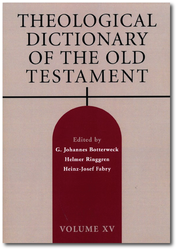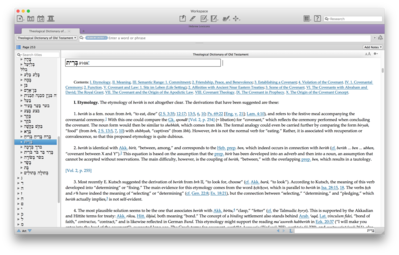 For a number of years, our users have been requesting an Accordance edition of the 15-volume Theological Dictionary of the Old Testament. Well, the wait is finally over! Beginning today, the TDOT is now available for the Accordance Library!
For a number of years, our users have been requesting an Accordance edition of the 15-volume Theological Dictionary of the Old Testament. Well, the wait is finally over! Beginning today, the TDOT is now available for the Accordance Library!
The Theological Dictionary of the Old Testament is the companion series of Kittel and Bromiley’s Theological Dictionary of the New Testament (TDNT), also available for Accordance in complete or abridged form. Like its companion series, the TDOT has been carefully translated from the German into English that is accessible to both scholars and beginning students.
An international team of 148 contributors, spanning multiple Christian and Jewish faith traditions, produced the 1094 separate articles comprising the TDOT. What distinguishes the TDOT? It is known for its detailed analysis of Hebrew words, an examination of their original context, and their ultimate theological significance.
From the publisher’s description:
The intention of the writers is to concentrate on meaning, starting from the more general, everyday senses and building to an understanding of theologically significant concepts. To avoid artificially restricting the focus of the articles, TDOT considers under each keyword the larger groups of words that are related linguistically or semantically. The lexical work includes detailed surveys of a word’s occurrences, not only in biblical material but also in other ancient Near Eastern writings. Sumerian, Akkadian, Egyptian, Ethiopic, Ugaritic, and Northwest Semitic sources are surveyed, among others, as well as the Qumran texts and the Septuagint; and in cultures where no cognate word exists, the authors often consider cognate ideas.
TDOT’s emphasis, though, is on Hebrew terminology and on biblical usage. The contributors employ philology as well as form-critical and traditio-historical methods, with the aim of understanding the religious statements in the Old Testament. Extensive bibliographical information adds to the value of this reference work.
Take, for example, the TDOT’s treatment of the word בְּרִית (bᵉrı̂ṯ), often translated as covenant in English Bibles. Through 25 pages and 10 distinct sections, the writer begins with etymology, meaning, and semantic range; then guides the reader through biblical and extrabiblical use; and finally determines theological implications such as the excerpt below:
The new developments in covenant research brought into broad relief especially the idea of the kingship of God. It now becomes clear that God as king of Israel is not an idea born during the period of the monarchy, as scholars used to think, but on the contrary, is one of the most genuine and most ancient doctrines in Israel.
The Theological Dictionary of the Old Testament is the perfect addition to the Accordance Library of anyone taking seriously the study of the Old Testament and biblical Hebrew. Accordance developers have carefully scrutinized every detail of the content of the TDOT, tagging the text according to the following fields: Hebrew Entry, Titles, Transliterated Entry, English Content, Scripture, Greek Content, Hebrew Content, Transliterated Content, Authors, and Page Numbers. Such careful categorization of the TDOT allows you to find the exact content you need both quickly and efficiently.
 Theological Dictionary of the Old Testament
Theological Dictionary of the Old Testament
$699
For an in-depth analysis of this series, be certain to check out Brian Davidson’s review of the Theological Dictionary of the Old Testament in Accordance. Brian gives focus to the features of the TDOT that distinguish it from other lexicons, and he also compares it specifically to the New International Dictionary of Old Testament Theology and Exegesis (NIDOTTE).


